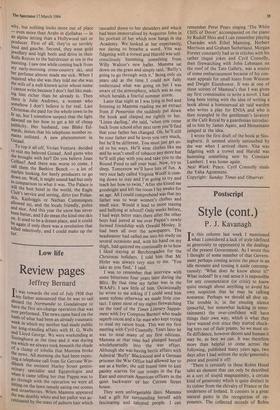Low life
Review pages
Jeffrey Bernard
It was towards the end of July 1938 that
my father announced that he was to sail aboard the Normandie to Guadaloupe to have the first sex-change operation that was ever performed. The news came hard on the heels of what had been an already traumatic week in which my mother had made public her long-standing affairs with H. G. Wells and Lloyd George. We were weekending at Sissinghurst at the time and it was during tea which we always took beneath the shade of a clump of lobelia that Mamma broke the news. All morning she had been expec- ting a telephone call from Sir Gervase Win- dibank the eminent Harley Street genito- urinary specialist and Egyptologist and when it came telling her that Pappa was to go through with the operation we were all sitting on the lawn tensely eating our scones and strawberries. When Mamma appeared she was deathly white and her pallor was ac- centuated by the mass of auburn hair which cascaded down to her shoulders and which had been immortalised by Augustus John in his portrait of her which now hangs in the Academy. We looked at her expectantly, not daring to breathe a word. Vita was fidgeting with a trowel and Harold was self- consciously humming something from Willy Walton's new ballet. Mamma sat down on the grass and simply said, `Buffy's going to go through with it.' Being only six years old at the time I could not fully understand what was going on but I was aware of the atmosphere, which was as one which heralds a fearful summer storm.
Later that night as I was lying in bed and listening to Mamma reading me an extract from Il Penseroso she suddenly put down the book and clasped me tightly to her. `Listen darling,' she said, 'when you come back from school after next term you'll find that your father has changed. Oh, he'll still be your father and he loves you very much, but he'll be different. You must just get us- ed to his ways. He'll wear clothes like me and he won't smell of tobacco any more but he'll still play with you and take you to the Round Pond to sail your boat. Now, try to sleep. Tomorrow we'll have lots of fun. A very nice lady called Virginia Woolf is com- ing down to stay and I'm going to try and teach her how to swim.' After she kissed me goodnight and left the room I lay awake for an age. All I could comprehend was that my father was to wear women's clothes and smell nice. Would it lead to more teasing and bullying at school? Only weeks before, I had wept bitter tears there after the other boys had jeered at me over Pappa's newly formed friendship with Oswald Mosley. It had been all over the newspapers. The headmaster had called me into his study on several occasions and, with his hand on my thigh, had quizzed me continually as to how I liked staying at Berchtesgaden for the Christmas holidays. I told him that Mr Hitler was always very nice to me. 'You take as you find,' I said.
I was to remember that interview with some bitterness four years later during the Blitz. By that time my father was in the WAAFs. I saw little of him. Occasionally he wrote to me asking if I could send him some nylons otherwise we made little con- tact. I spent most of my nights firewatching on the roof of the Times Literary Supple- ment with Ivy Compton Burnett who made superb cocoa and a fat man who kept trying to steal my ration book. This was my first meeting with Cyril Connolly. Years later he was to steal many of my first editions. Mamma at that time had plunged herself wholeheartedly into the war effort. Although she was having hectic affairs with Admiral `Buffy' Blackwood and a German prisoner the War Office had allowed her to use as a butler, she still found time to knit paisley scarves for our troops in the Far East and entertain American officers in the quiet backwater of her Curzon Street house.
They were unforgettable days. Mamma had a gift for surrounding herself with fascinating and talented people. I can remember Peter Pears singing 'The White Cliffs of Dover' accompanied on the piano by Rudolf Hess and I can remember playing Charades with Ethel Manning, Herbert Morrison and Graham Sutherland. Morgan Forster constantly had us in stitches with his rather risque jokes and Cyril Connolly, then firewatching with John Lehmann on the roof of the Tate Gallery, was a source of some embarrassment because of his con- stant appeals for small loans from Winston and Dwight Eisenhower. It was at one of these soirees of Mamma's that I was given my first commission to write a novel. I had long been toying with the idea of writing a book about a homosexual air raid warden who writes a play for ENSA and who is then strangled in the gentleman's lavatory at the Cafe Royal by a guardsman introduc- ed to him by James Agate, and Heinemann jumped at the idea.
I wrote the first draft of the book at Siss- inghurst. It seemed utterly untouched by the war when I arrived there. Vita was fidgeting with a trowel and Harold was humming something new by Constant Lambert. I was home again.
Next Week: Peace. Cyril Connolly steals the Yalta Agreement.
Copyright: Sunday Times and Observer.














































 Previous page
Previous page